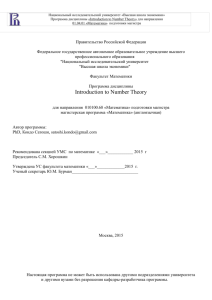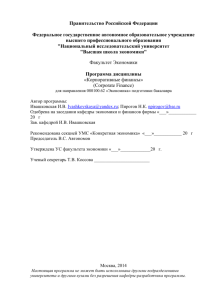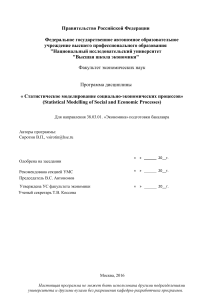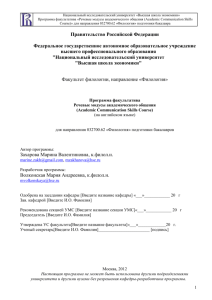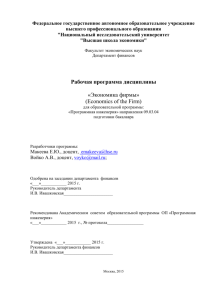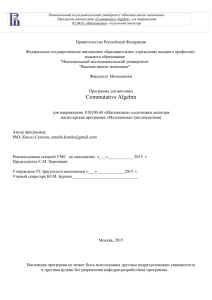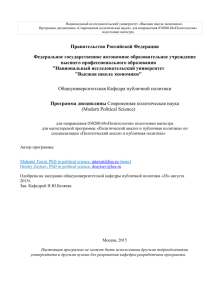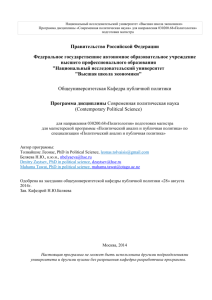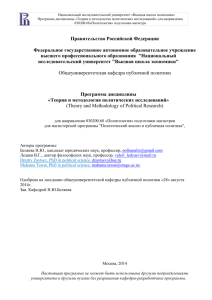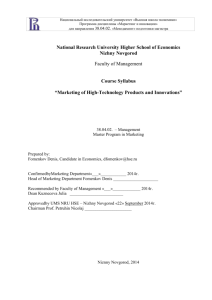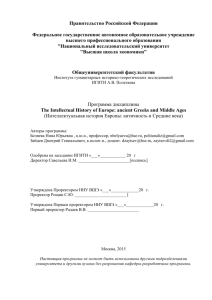DOC, 166 Кб - Высшая школа экономики
advertisement
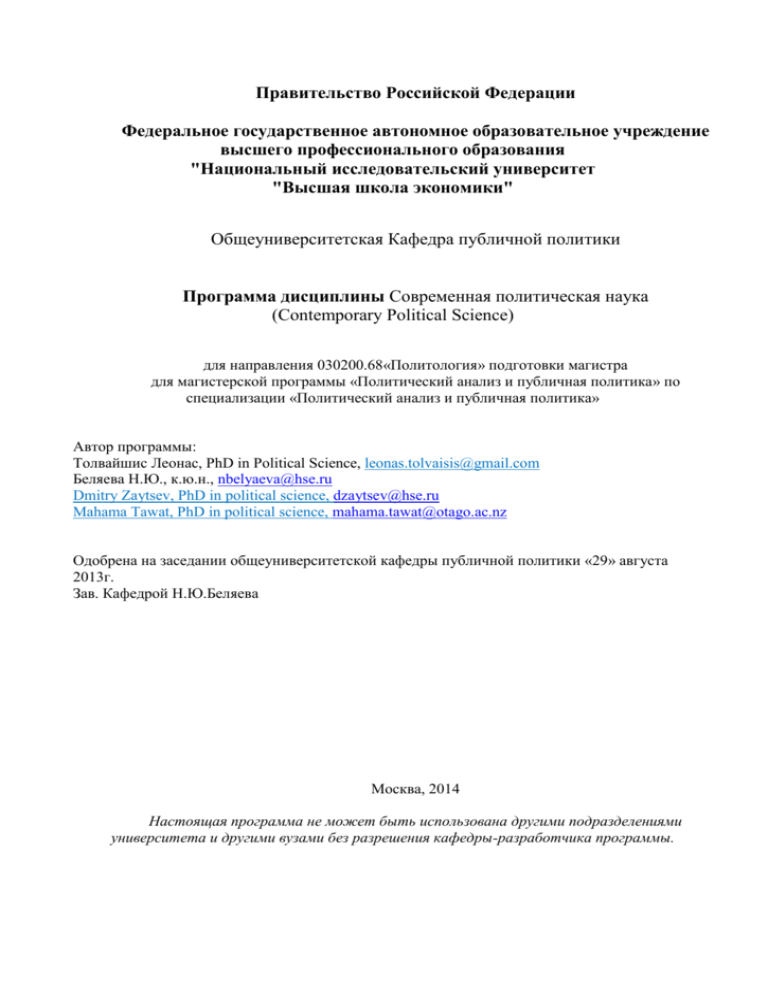
Правительство Российской Федерации Федеральное государственное автономное образовательное учреждение высшего профессионального образования "Национальный исследовательский университет "Высшая школа экономики" Общеуниверситетская Кафедра публичной политики Программа дисциплины Современная политическая наука (Contemporary Political Science) для направления 030200.68«Политология» подготовки магистра для магистерской программы «Политический анализ и публичная политика» по специализации «Политический анализ и публичная политика» Автор программы: Толвайшис Леонас, PhD in Political Science, leonas.tolvaisis@gmail.com Беляева Н.Ю., к.ю.н., nbelyaeva@hse.ru Dmitry Zaytsev, PhD in political science, dzaytsev@hse.ru Mahama Tawat, PhD in political science, mahama.tawat@otago.ac.nz Одобрена на заседании общеуниверситетской кафедры публичной политики «29» августа 2013г. Зав. Кафедрой Н.Ю.Беляева Москва, 2014 Настоящая программа не может быть использована другими подразделениями университета и другими вузами без разрешения кафедры-разработчика программы. Национальный исследовательский университет «Высшая школа экономики» Программа дисциплины «Современная политическая наука» для направления 030200.68«Политология» подготовки магистра 1 Область применения и нормативные ссылки (Scope of Use) Настоящая программа учебной дисциплины устанавливает минимальные требования к знаниям и умениям студента и определяет содержание и виды учебных занятий и отчетности. Программа предназначена для преподавателей, ведущих данную дисциплину, учебных ассистентов и студентов направления подготовки/ специальности 030200.68 «Политология», обучающихся по магистерской программе «Политический анализ и публичная политика» изучающих дисциплину «Современная политическая наука». Программа разработана в соответствии с: Образовательным стандартом НИУ ВШЭ по направлению подготовки 030200.68 «Политология» (уровень подготовки – магистр); Образовательной программой «Политический анализ и публичная политика» по направлению подготовки 030200.68 «Политология» (уровень подготовки – магистр) Рабочим учебным планом университета по направлению подготовки 030200.68 «Политология» (уровень подготовки – магистр), Магистерской программы «Политический анализ и публичная политика», специализации «Политический анализ и публична политика», утвержденным в 2013 г. The present program established minimum demands of students’ knowledge and skills and determines content of the course. The present syllabus is aimed at department teaching this course, their teaching assistants, and students of the degree program 030200.68 ‘Political Science’, master’s program ‘Political Analysis and Public Policy’. This syllabus meets the standards required by: Standards of National Research University Higher School of Economics of Federal Masters’ Degree Program 030200.68 “Political Science”, Master’s program ‘Political Analysis and Public Policy’ of Federal Masters’ Degree Program 030200.68 “Political Science”, Curriculum of the master’s program ‘Political Analysis and Public Policy’ as of 2013. 2 Цели освоения дисциплины (Learning Objectives) To trace connections between Russian and international political science. The way in which ideas of international and European political science are being developed in Russian political science. Conversely, to evaluate influence and contribution of Russian political science to international, European and East-European political science. Overview of the main research areas of Russian political science, history of its development and formation; Institutionalization of Russian political science and its main scientific schools; Overview of the most dynamic Russian political science points of growth in Moscow, St. Petersburg and other university cities; Overview of the main political science development trends and structures in Europe, East Europe in particular, as well as institutionalized in ECPR and IPSA world political science. Национальный исследовательский университет «Высшая школа экономики» Программа дисциплины «Современная политическая наука» для направления 030200.68«Политология» подготовки магистра 3 Компетенции обучающегося, формируемые в результате освоения дисциплины (Learning outcomes) Code (RUS) Code (ENG) Competence description СК-1 SC-1 СК-2 SC-2 СК-3 SC-3 СК-8 SC-8 Ability to analyze and improve familiar research methods and professional skills Ability to generate concepts and theoretical models, to test new methods and tools for professional activities Ability to learn new research methods and approaches on his/her own, to evolve professionally Ability to carry out research and other professional activities in an international environment Professional competencies Code (RUS) Code (ENG) Competence description ПК-1 PC-1 ПК-2 PC-2 ПК-3 PC-3 ПК-4 PC-4 Ability to organize research and analytical teamwork Ability to use organizational and managerial skills in her/his research and social projects, consulting activities, analytical work. Ability to freely use foreign languages for professional communication Ability to communicate effectively with different audiences, to deliver her/his message clearly and to tailor it depending on the audience’s age, education, attitude to the speaker, etc. 4 Role of the discipline within the structure of Master program This course is based on knowledge and competences which were provided by the following disciplines: ● History of political theories ● Political analysis Национальный исследовательский университет «Высшая школа экономики» Программа дисциплины «Современная политическая наука» для направления 030200.68«Политология» подготовки магистра The following knowledge and competences are needed to study the discipline: ● The basic skills of political analysis ● The basic knowledge of the structure of the political systems ● General knowledge of political theory ● Some general knowledge of sociology Main competences developed by studying this discipline can be used to study the following discipline: ● Theory and methodology of political research ● Public policy 5. Course Plan № Topic 1 Contemporary European political science Vs 1 American Political Science 2 Decentralization of governance. Regionalization. 2 Multi-level governance 3 Political institutions and institutional research. 3 4 Policy change. Drivers of policy change. Transfer 4 and transformations 5 Psychological aspects of voting behavior: wider im5 plications for public policy 6 Identity as a subject of political analysis. 6 6 Ethno politics. Ethnic minority policies. Ethnic mi7 nority rights protection: international legal framework and policy practices 8 From New Public Management towards Digital Era 8 Governance 1 Russian political science: birth and structuring 9 (from Soviet Association of Political Science to up-to-date projects of RAPS (RAPS congresses and conferences, cooperation with international associations, project “Sub disciplines” , Research Committees of RAPS) 1 Global and European Political Science Associa10 tions: IPSA, ECPR 1 How to propose a paper for international confer11 ence? Total: Total hours Contact hours Independent Lectures Seminars students’ work 14 4 0 10 14 4 0 10 14 4 2 8 13 3 2 8 13 3 2 8 13 3 2 8 13 3 2 8 12 2 2 8 12 2 2 8 12 2 2 8 14 2 4 8 144 32 20 92 Национальный исследовательский университет «Высшая школа экономики» Программа дисциплины «Современная политическая наука» для направления 030200.68«Политология» подготовки магистра 6. Requirements and Grading Type of Type of grading work Essay 1st year 1 7 Current Homework 8 Midterm Test Final Test 9 9 2 Characteristics 4 Text with review of contemporary research in choosing field of contemporary political science, with identification new trends and ideas in Russian and Foreign political and social sciences literature, and with application of these trends and ideas toward public policy field, what are current research questions in this field, what are the most important and less important research questions and why Research proposal of individual research based on the current state of the discipline and sub-disciplines of contemporary political science Multiple choice test with close-ended questions Test with open-ended questions 3 6.1. Course Grade Criteria Essay. Text with review of contemporary research in choosing field of contemporary political science, with identification new trends and ideas in Russian and Foreign political and social sciences literature, and with application of these trends and ideas toward public policy field, what are current research questions in this field, what are the most important and less important research questions and why. Homework. Research proposal of individual research based on the current state of the discipline and subdisciplines of contemporary political science. Mid-term Test. Examples of Questions: Please select the correct answers (some questions can have more than one correct answer!) 1. The first European country to create a national political science association was: a) Finland; b) France; c) Spain; d) United Kingdom; e) USSR. 5. Which of the following statements regarding differences between an institution and an organization (according to Douglass North) are true: a) organizations are a special kind of institution, with additional features; b) both organizations and wider institutional arrangements possess criteria to establish their boundaries and to distinguish their members from nonmembers; c) actions of organizations are a major cause of the change of the wider institutional structure. Final Test. Please, formulate an application for participation in international scientific conference (one page long). 7. Course Description Topic 1. Contemporary European political science vs. American political science Национальный исследовательский университет «Высшая школа экономики» Программа дисциплины «Современная политическая наука» для направления 030200.68«Политология» подготовки магистра The current state of political science as a discipline. Introduction to frontlines and development trends of contemporary political science: main directions, concepts and ideas currently debated in global political science literature. From nation-state-centered comparative public policy approach toward global analysis framework. Public policy drivers. Globalization and global governance (global public policy). Internetization and internationalization of political science. Evidence-based knowledge. Post-rational-choice paradigms: agent-based models and network analysis in public policy. A trend of interdisciplinarity in political science research: main reasons. Main centers for the study of political science in the world and in Europe. Political science in Central and Eastern Europe. Required readings: • Klingemann H.-D. Capacities: Political Science in Europe. West European Politics, 31 (1-2), 2008, P. 370-396. • Norris, Pippa Towards a More Cosmopolitan Political Science? European Journal of Political Research, 31, 2008. P. 17–34. • • • • • • • • • • • • Suggested readings: Dunleavy P. New worlds in political science // Political Studies. No. 58 (1), 2010. P. 239-265. Kennett P. Introduction: governance, the state and public policy in a global age // Governance, Globalization and Public Policy. Edited by Patricia Kennett. Edward Elgar Publisher. Cheltenham. 2008. P. 3-18. Stone D. Global public policy, transnational policy communities, and their networks // Policy Studies Journal. Vol. 36, No.1, 2008. P. 19-38. The State of Political Science in Western Europe. Edited by Hans-Dieter Klingemann. B.Budrich. Opladen. 2007. P. 11-41 (русское издание: Политическая наука в Западной Европе. Под ред. Ханса-Дитера Клингеманна. М.: Аспект Пресс, 2009). Ilyin M. and Malinova O. Political Science in Russia: Institutionalization of the Discipline and Development of the Professional Community. http://www.gesis.org/knowledgebase/archive/politicalscience/russia/report1.html. Eduardo Araral Jr., Scott Fritzen, Michael Howlett, M. Ramesh and Xun Wu (eds.). Routledge Handbook of Public Policy. New York: Routledge, 2013. Klingemann H.-D. Political Science in Central and Eastern Europe: National Development and International Integration. http://www.gesis.org/knowledgebase/archive/politicalscience/article1.html. The future of political science. Edited by Gary King, Kay Lehman Schlozman, Norman H. Nie. Routedge. NY & London. 2009. New Models of Governance in the Global System. Edited by Mathias Koenig-Archibugi and Michael Zürn. Exploring Publicness, Delegation and Inclusiveness. Palgrave Macmillan. Basingstoke. 2006. Rhodes R.A.W. The New Governance: Governing without Government // Political Studies. No. XLIV. 1996. P. 652-667. Head B. Evidence-based policy: principles and requirements. http://www.pc.gov.au/__data/assets/pdf_file/0007/96208/03-chapter2.pdf. Salamon T. Design of Agent-Based Models: Developing Computer Simulations for a Better Национальный исследовательский университет «Высшая школа экономики» Программа дисциплины «Современная политическая наука» для направления 030200.68«Политология» подготовки магистра • • • • • • • • • • • • • • • • Understanding of Social Processes. Bruckner Publishing. 2011. “Introduction” and “Methodology of social sciences”; P. 1-12; “Limits of agent-based modeling”, P. 95-102. http://www.designofagentbasedmodels.info/ Chen-Yu Wu and Knoke D. Policy Network Models // Routledge Handbook of Public Policy. Edited by Eduardo Araral Jr., Scott Fritzen, Michael Howlett, M. Ramesh and Xun Wu. New York: Routledge, 2013. P. 154-164. Reinicke W. H. Globalization and Public Policy: An Analytical Framework // Global Public Policy: Governing Without Government? Washington, 1998. P. 52-64. Reinicke W. H. Policy Responses: Matching Economic and Political Geography // Global Public Policy: Governing Without Government? Washington, 1998. P. 75-101. McCool D. C. Public Policy Theories, Models, and Concepts: An Anthology. N.J., 1995. Guy Peters B. and Pierre J. Handbook of Public Policy. London: Sage, 2006. Birkland T. A. An Introduction to the Policy Process. Theories, Concepts, and Models of Public Policy Making. New York: M.E.Sharpe, 2011. Anderson J. A. Public Policymaking: An Introduction. Boston: Wadsworth, 2011. A new handbook of political science. Edited by Robert E.Goodin and Hans-Dieter Klingemann. Oxford Iniversity Press. 1996. Dunleavy P., Margetts H., Bastow S. and Tinkler J. Digital Era Governance: IT Corporations, the State and e-Government. Oxford University Press. 2008. Robins G., Lewis J. M., Wang P. Statistical Network Analysis for Analyzing Policy Networks // Policy Studies Journal. Volume 40, Issue 3, 2012. P. 375-401. Koenig-Archibugi M. Is global democracy possible? // European journal of international relations. No. 17 (3), 2011. P. 519-542. Nina Belyaeva. Public Policy in Russia: Actors' Interests and Modernization of Institutions. http://www.iuctorino.it/sites/default/files/docs/Belyaeva%20%20Public%20Policy%20in%20Russia.pdf. Публичная политика в современной России: субъекты и институты: сб. ст. / отв. ред.сост. Н.Ю. Беляева, ГУ-ВШЭ. М.: ТЕИС, 2006. С. 7-26. Публичная политика: от теории к практике / сост. и науч. ред. Н.Ю. Данилова, О.Ю. Гурова, Н.Г. Жидкова. Спб.: Алетейя, 2008. Политическая наука в России: проблемы, направления, школы (1990-2007): сборник / отв. ред. Малинова О.Ю. и др. - М.: РОССПЭН, 2008. Политическое управление и публичная политика XXI века: Государство, общество и политические элиты / Редкол.: О.В. Гаман-Голутвина (отв. ред.) и др. - М.: РАПН, РОССПЭН, 2008. Topic 2. Decentralization of governance. Regionalization. Multi-level governance. Decentralization: main definitions, varieties, models, reasons for application in public governance. The principles of subsidiarity and proportionality. Forms of decentralization: deconcentration, delegation, devolution and privatization – distinctions and peculiarities of application. Formal, dynamic, functional and governance approaches to decentralization: strengths and weaknesses. Regionalization and regionalism: definition of concepts and their causal links. Criteria for measuring decentralization level and success. Decentralization rankings of Central and Eastern European countries. Multi-level governance: origins of the concept, links to European integration, application in the EU. Dimensions of multilevel governance – transfer of competences from nation-states upwards, sideways and downwards: changing relationships between actors of public policy. Required readings: Национальный исследовательский университет «Высшая школа экономики» Программа дисциплины «Современная политическая наука» для направления 030200.68«Политология» подготовки магистра • Piattoni S. Multi-level Governance: a Historical and Conceptual Analysis // European Integration. Vol. 31, No. 2. 2009. P. 163-18. • Fleurke F. and Willemse R. Approaches to Decentralization and Local Autonomy: A Critical Appraisal // Administrative Theory & Praxis. Vol. 26, No. 4. 2004. P. 523-544. • • • • • • • • • • • • • • • • Suggested readings: Bauer M. W. and Börzel T. A. Regions and the European Union // Handbook on Multi-Level Governance. Edited by Henrik Enderlein, Sonja Wälti and Michael Zürn. Edward Elgar Publishing. Cheltenham, Northampton. 2010. P. 253-265. Obydenkova A. Multi-level governance in post-Soviet Eurasia: problems and promises // Handbook on Multi-Level Governance. Edited by Henrik Enderlein, Sonja Wälti and Michael Zürn. Edward Elgar Publishing. Cheltenham, Northampton. 2010. P. 292-307. The Committee of the Regions’ White Paper on Multilevel Governance. 2009. http://www.aer.eu/fileadmin/user_upload/MainIssues/Governance/CoR_Consultation_Whitebo ok_on_Multilevel_Governance/EN_CoR_Whitebook_on_Multilevel_Governance.pdf Assembly of European Regions. AER position on Multilevel governance. Adopted in Belfort on 26 November 2009. http://www.aer.eu/fileadmin/user_upload/Commissions/InstitutionalAffairs/EventsAndMeeting s/2009/Adopted_Documents_GA_2009/EN__MLG_DEF.doc Johnson R. W., Minis H. P. Toward Democratic Decentralization: Approaches to Promoting Good Governance. Research Triangle Institute. http://www.rti.org/pubs/toward_demo_decen.pdf. Dubois H. F. W. & Fattore G. Definitions and typologies in public administration research: the case of decentralization // International Journal of Public Administration. Vol. 32, No. 8. 2009. P. 704-727. Hooghe L., Marks G., Schakel A. H. The Rise of Regional Authority: a comparative study of 42 democracies (1950-2006). Routledge. London. 2010. http://www.falw.vu/~mlg/data.html Marks G. and Hooghe L. Unravelling the central state, but how? Types of multi-level governance // American Political Science Review. Vol. 97, No. 2. 2003. P. 233-43. Schrijver F. J. Regionalism After Regionalisation: Spain, France and the United Kingdom. Amsterdam University Press. 2006. Camoes P. J. Political decentralization in Western Europe and the dynamics of institutional change: an empirical analysis // EGPA Conference. Toulouse. 2010. http://www.uprc.be/images/EGPA%202010%20-%20Paper%20Camoes.pdf Decentralization in Europe and the CIS. UNDP Bratislava Regional Centre. 2008. http://europeandcis.undp.org/home/show/40C828BF-F203-1EE9-B8AD8528724FD745. Daniel Treisman. The Architecture of Government: Rethinking Political Decentralization. Cambridge: Cambridge University Press. P. 21-27, 270-294. Andrés Rodriguez-Pose et Richard Sandall. 2008. From identity to the economy: analysing the evolution of decentralisation discourse. Environment and planning C: Government and policy. 26: 54-72. Транснациональное политическое пространство: новые реальности международного развития / Косолапов Н.А., Стрежнева М.В., Войтоловский Ф.Г. и др., отв. ред. Стрежнева М.В. М.: ИМЭМО РАН, 2010. 266 с. Стрежнева М.В. „Трансправительственные сети“ в ЕС // Международные процессы. 2008. № 1 (16). Т. 6. // http://www.intertrends.ru/sixteenth/016.htm Саворская Е.В. Политические сети в многоуровневом управлении ЕС. / Международные отношения. Политология. Регионоведение. Вестник Нижегородского университета им. Н.И.Лобачевского, 2012, 4 (1), с. 368-373. Национальный исследовательский университет «Высшая школа экономики» Программа дисциплины «Современная политическая наука» для направления 030200.68«Политология» подготовки магистра • http://www.unn.ru/pages/issues/vestnik/99999999_West_2012_4/61.pdf Махина С.Н. Децентрализация государственного администрирования как средство обеспечения демократии и правомерности государства: Гражданское общество и государство в России: обеспечение демократии и правомерности // Юридические записки: Гражданское общество и государство в России: обеспечение демократии и правомерности. Воронеж: Изд-во Воронеж. ун-та, 2006, Вып. 20. С. 110-130. http://www.rosreforma.ru/?id=302 Topic 3. Political institutions and institutional research Institutes and institutions: terminological distinction and approaches. Institutional approach: explanatory capacities and limitations. Institutions: definition, development (formation, operation and change), institutions' impact on public policy (decision making and resource use). Diversity of institutional arrangements and organizational behaviour. Generalization by Elinor Ostrom: Multilevel Analytical Structure. Institutional Analysis and Development framework proposed by E. Ostrom. Application of game theory to institutional analysis. Components of institutional analysis: strategies, norms, and rules. Collective-choice rules, collective-action problems, social dilemmas. Institutional innovations: local collective action by communities of actors (users, consumers) managing public goods as an alternative to both state and market regulation. Required readings: • • • • • • • • • • • Ostrom E. Beyond Markets and States: Polycentric Governance of Complex Economic Systems // American Economic Review. Vol. 100, No. 3. 2010. P. 641-672. Suggested readings: Ostrom E. Understanding Institutional Diversity. Princeton University Press. 2009. P. 3-29, 217-254. Hodgson G. M. What are institutions? // Journal of Economic Issues. Vol. XL, No. 1. 2006. P. 1-25. Guy Peters B. Institutional Theory in Political Science. The 'New Institutionalism'. Continuum. London. 2005. P. 47-70, 155-166. Understanding Knowledge as a Commons: From Theory to Practice. Edited by Elinor Ostrom and Charlotte Hess. The MIT Press. Cambridge, MA. 2006. Hall P. A. and Taylor R. C. R. Political Science and the Three New Institutionalisms. http://www.mpifg.de/pu/mpifg_dp/dp96-6.pdf. Sandberg M., Lundberg P. Political Institutions and Their Historical Dynamics// PLoS ONE. Vol. 7, No. 10. 2012. e45838. http://www.plosone.org/article/info%3Adoi%2F10.1371%2Fjournal.pone.0045838 Институциональная политология: Современный институционализм и политическая трансформация России // Под ред. С.В.Патрушева. - М.: ИСП РАН, 2006. \\ http://www.isras.ru/publ.html?id=623. Урбан М. Социальные отношения и политические практики в посткоммунистической России.– «Полис. Политические исследования». – 2002. – №4. – С. 66-85. http://www.civisbook.ru/files/File/Urban_2002_4.pdf. Политические институты на рубеже тысячелетий. - Дубна: ООО “Феникс+”, 2001. Пономарева Е.Г. Политические институты и отношения в современной России. Учебник для вузов. М.: МГИМО, РОССПЭН, 2007. Topic 4. Policy change. Drivers of policy change. Transfer and transformations Национальный исследовательский университет «Высшая школа экономики» Программа дисциплины «Современная политическая наука» для направления 030200.68«Политология» подготовки магистра Definition and concept of policy change. Theoretical frameworks explaining policy change: classifications of types, content and levels of policy change. Historical sequencing of policy change: cyclical, dialectic, linear and teleological paradigms, their strengths and weaknesses. Models of change, their suppositions and assumptions. Domestic and international drivers of policy change: definition, types of drivers, forms of their interaction. Role played by political institutions in policy change: the veto player theory. Mechanisms of policy changes. Examples of policy changes. Features and varieties of policy transfer, its limitations and alternatives. Spheres, actors, reasons of policy transfer. Hard and soft, voluntary and coercive transfer. Institutional change, transfer and transformation: world and Russian experiences. Required readings: • Capano G. Understanding Policy Change as an Epistemological and Theoretical Problem // Journal of Comparative Policy Analysis. Vol. 11, No. 1. 2009. P. 7-31. • Howlett M. & Cashore B. The Dependent Variable Problem in the Study of Policy Change: Understanding Policy Change as a Methodological Problem // Journal of Comparative Policy Analysis. Vol. 11, No. 1. 2009. P. 33-46. • • • • • • • • • • • • • • Suggested readings: European and North American Policy Change: Drivers and Dynamics. Edited by Giliberto Capano and Michael Howlett. Routledge. London. 2009. P.1-13, 217-233. Benson D. and Jordan A. What have we learned from policy transfer research? Dolowitz and Marsh revisited // Political Studies Review. Vol. 9, No. 3. 2011. P. 366-378. James O., Lodge M. The Limitations of 'Policy Transfer' and 'Lesson Drawing' for Public Policy Research // Political Sciences Review. Vol. 1, No. 2. 2003. P. 179-193. Real-Dato J. Mechanisms of Policy Change: A Proposal for a Synthetic Explanatory Framework // Journal of Comparative Policy Analysis. Vol. 11, No. 1. 2009. P. 117-143. Zohlnhöfer R. How Politics Matter When Policies Change: Understanding Policy Change as a Political Problem // Journal of Comparative Policy Analysis. Vol. 11, No. 1. 2009. P. 97-115. Rayner J. Understanding Policy Change as a Historical Problem // Journal of Comparative Policy Analysis. Vol. 11, No. 1. 2009. P. 83-96. Dolowitz D.and Marsh D. Learning from abroad: The role of policy transfer in contemporary policy-making // Governance. Vol. 13, No. 1. 2000. P. 5-24. Ladi S. Globalisation, Policy Transfer and Policy Research Institutes. Edward Elgar. Cheltenham. 2005. Carothers T., The End of the Transition Paradigm // Journal of Democracy. Vol. 13, No. 1. January 2002. P. 5-21. Cortell A.and Petersen S. Altered States: Explaining Domestic Institutional Change // British Journal of Political Science. Vol. 29, No. 1. 1999. P. 177-203. North D. D. Institutions, Institutional Change, and Economic Performance. Cambridge University Press. New York. 1990. Pierson P. Increasing Returns, Path Dependence, and the Study of Politics // American Political Science Review. Vol. 94, No. 2. 2000. P. 251-267. Weingast B. Persuasion, preference change, and critical junctures: the microfoundations of a macroscopic concept // Preferences and Situations. Edited by Ira Katznelson and Barry Weingast. Russell Sage Foundation. New York. 2005. P. 161-184. Кузьминов Я., Радаев В., Яковлев А., Ясин Е. Институты: от заимствования к выращиванию (опыт российских реформ и возможности культивирования Национальный исследовательский университет «Высшая школа экономики» Программа дисциплины «Современная политическая наука» для направления 030200.68«Политология» подготовки магистра институциональных изменений) // Вопросы экономики. 2005. № 5. Topic 5. Psychological aspects of voting behaviour: wider implications for public policy Political psychology and human cognition studies: relevant dimensions for public policy. Links between electoral mobilization and public policy. Spatial theory of voting (proximity model), directional voting: relevance for public policy. Sources of policy expertise within public policy network. Rational choice, bounded rationality and cognitive psychology approaches compared: strengths and weaknesses; implications for public policy. 'Cognitive shortcuts': definition of the concept, its impact on voting behaviour; implications of cognitive schemata for policy agenda-setting, policy implementation and policy evaluation. Examples from different countries and policy areas. Issue voting; 'easy' versus 'hard' policy issues; policy issue linkage: implications for policymaking. Required readings: • De Vries C.E. Issue Linkage: How Hard Policy Issues Affect Voters’ Electoral Choices. April 2012. http://www.catherinedevries.eu/IssueLinkage.pdf. • Bryan J. D. Bounded Rationality and Political Science: Lessons from Public Administration and Public Policy. Journal of Public Administration Research and Theory. Volume 13, Issue 4. 2003. P. 395-412. • • • • • • • • • • Suggested readings: Rogowski J.C. The Shortfalls of Shortcuts: Elections, Heuristics, and Vote Choice. Washington University in St. Louis. 31 July 2013. http://pages.wustl.edu/files/pages/imce/rogowski/shortfalls_shortcuts.pdf. Zakharov A.V. and Fantazzini D. Idiosyncratic issue salience in spatial voting models: The cases of Netherlands, UK, and Israel. 2008. http://www.politecon.ru/zakharov/statii/salience.pdf. Tolvaišis L. Ethnic minority policies and political parties’ appeal to ethnic voters: a case study of Estonia’s Russians // Baltic Journal of Law & Politics. Vol. 4, No. 1. 2011. P. 106-133. Müller W. and Strøm K. Policy, Office, or Votes? How Political Parties in Western Europe Make Hard Decisions. Cambridge University Press. Cambridge. 1999. Bryan D. Jones. Bounded rationality and public policy: Herbert A. Simon and the decisional foundation of collective choive. Policy Sciences 35: 269-284, 2002. Pedersen, H. H. Policy-seeking parties in multiparty systems: Influence or purity? // Party Politics. Vol. 16, No. 6. 2010. P. 737-754. McMenamin I. and Gwiazda A. Three roads to institutionalisation: Vote-, Office- and Policyseeking explanations of party switching in Poland // European Journal of Political Research. Vol. 50, No. 6. 2011. P. 838-866. Baldassarri D. “Heterogeneity of the decision-making process” and “Conclusions” (Chapters 7 & 8) // In: Baldassarri D. The Simple Art of Voting: The Cognitive Shortcuts of Italian Voters. Oxford. 2012. Nielsen H. Ø. Bounded Rationality in Decision-making: How Cognitive Shortcuts and Professional Values May Interfere with Market-based Regulation. Manchester University Press. 2010. P. 17-66, 145-181. Public Policy and Bounded Rationality // Munro A. Bounded Rationality and Public Policy. A Perspective from Behavioural Economics. Springer. London. 2009. P. 133-162. Национальный исследовательский университет «Высшая школа экономики» Программа дисциплины «Современная политическая наука» для направления 030200.68«Политология» подготовки магистра • Шестопал Е. Б. Политическая http://www.gumer.info/bibliotek_Buks/Psihol/Shestop/index.php. психология // Topic 6. Identity as a subject of political analysis The concept of identity in contemporary political science. Explaining the notion of identity: definitions. Identity as a category of political science and as a subject of political analysis: reasons and ways of becoming model to politics and policy studies. Varieties of identity: political, civic, national, civilizational and ethnic identities. Movement toward the emergence of an overarching theory of identity within political science. The content and contestation of identity. Political identities in transition societies. Identity transformations. Identity crisis. The politics of identity: a social theory perspective. The impact of modernization and globalization on societies' identities: global problems and local peculiarities; quest for national and civilizational identities. Imagery of national identity and challenges for the civic nation. Recent methodological achievements in empirical measurements of identity. Measurement techniques compared. Required readings: • Abdelal R., Herrera Y. M., Johnston A. I., McDermott R. Identity as a Variable // Measuring Identity: A Guide for Social Scientists. Edited by Rawi Abdelal, Yoshiko M. Herrera, Alastair Iain Johnston and Rose McDermott. Cambridge University Press. Cambridge. 2009. P. 17-32. • Smith R. M. The politics of identities and the tasks of political science // Problems and Methods in the Study of Politics. Edited by Ian Shapiro, Rogers M. Smith and Tarek E. Masoud. Cambridge University Press. Cambridge. 2004. P. 42-66. • • • • • • • Optional readings: Sylvan D. A. and Metskas A. K. Trade-offs in Measuring Identities: A Comparison of Five Approaches // Measuring Identity: A Guide for Social Scientists. Edited by Rawi Abdelal, Yoshiko M. Herrera, Alastair Iain Johnston and Rose McDermott. Cambridge University Press. Cambridge. 2009. P. 72-112. Беляева Н. Ю., Загладин Н. В. Политическая идентичность и политика идентичности / Отв. ред.: И. С. Семененко. Т. 2: Идентичность и социально-политические изменения в XXI веке. М.: Российская политическая энциклопедия, 2012. Беляева Н. Ю. Политическая идентичность и политика идентичности / Отв. ред.: И. С. Семененко; науч. ред.: И. С. Семененко, В. В. Лапкин, Л. А. Фадеева. Т. 1: Идентичность как категория политической науки: словарь терминов и понятий. М.: Российская политическая энциклопедия, 2012. Идентичность как предмет политического анализа: Сборник статей по итогам Всероссийской научно-теоретической конференции (ИМЭМО РАН, 21–22 октября 2010 г.). / Отв. ред.: И. С. Семененко, Л. А. Фадеева. М.: ИМЭМО РАН, 2011. Neuendorf K. A. and Skalski P. D. Quantitative content analysis and the measurement of collective identity // Measuring Identity: A Guide for Social Scientists. Edited by Rawi Abdelal, Yoshiko M. Herrera, Alastair Iain Johnston and Rose McDermott. Cambridge University Press. Cambridge. 2009. P. 203-236. Citrin J., Sears D. O. Balancing National and Ethnic Identities: The Psychology of E Pluribus Unum // Measuring Identity: A Guide for Social Scientists. Edited by Rawi Abdelal, Yoshiko M. Herrera, Alastair Iain Johnston and Rose McDermott. Cambridge University Press. Cambridge. 2009. P. 145-174. Henry E. Brady and Cynthia S. Kaplan. Conceptualizing and Measuring Ethnic Identity // Национальный исследовательский университет «Высшая школа экономики» Программа дисциплины «Современная политическая наука» для направления 030200.68«Политология» подготовки магистра • • • • • • • • • Measuring Identity: A Guide for Social Scientists. Edited by Rawi Abdelal, Yoshiko M. Herrera, Alastair Iain Johnston and Rose McDermott. Cambridge University Press. Cambridge. 2009. P. 33-71. European Identity. Edited by Jeffrey T. Checkel and Peter J. Katzenstein. Cambridge University Press. Cambridge. 2009. Ross M. H. Culture and Identity in Comparative Political Analysis // Comparative Politics: Rationality, Culture, and Structure. Edited by Lichbach Mark Irving, Alan S. Zuckerman. Cambridge University Press. Cambridge. 1997. P. 42-80. Castells M. The Power of Identity // The Information Age: Economy, Society, and Culture. Vol. II. Blackwell Pub. Oxford and Malden, MA. 1997. (на рус. яз.: Кастельс М. Информационная эпоха: экономика, общество и культура. М.: ГУ-ВШЭ, 2000). Smith A.D. National identity. Ethnonationalism in comparative perspective. University of Nevada Press. 1991. Tilly Ch. Identities, Boundaries and Social Ties. Paradigm Publishers. Boulder, CO. 2006. Touraine A. Can We Live Together? Equality and Difference. Stanford Univ. Press. Stanford. 2000. Пивоев В. М. Кризис идентичности и проблемы этнической, национальной и региональной идентификации в условиях Европейского Севера России // Приладожье и Русский Север: история, традиции и современность. М., 2002. http://petrsu.ru/Chairs/Culture/Identity.doc Ачкасов В. А. Этническая идентичность в ситуациях общественного выбора // Журнал социологии и социальной антропологии. 1999. P. 48-58. Данилова Е. Н., Ядов В. А. Нестабильная социальная идентичность как норма современных обществ // Социологические исследования, 2004. No. 10. http://www.isras.ru/files/File/Socis/2004-10/danilova_yadov.pdf. Topic 7. Ethnopolitics. Ethnic minority policies. Ethnic minority rights protection: international legal framework and policy practices Ethnopolitical studies as a subdiscipline of political science: definition of the object. Intersections with other disciplines. Main schools in the study of nationalism: reasons for a dissensus in the field. Primordialist, constructivist, and instrumentalist theoretical approaches: strengths and weaknesses. Relational approach: underlying assumptions and an attempt at building an universal theory of ethnicity. Ethnic minority policies: defining relevant public policy areas. Peculiarities of ethnic minority policy networks. Components of state unity. Multiculturalism and interculturalism. International regime of ethnic minority rights protection as a multi-layer system. Main documents making up the international legal framework. Policy practices: the challenge of implementation gap. Ethnopolitical studies in the world and in Russia: points of contact and divergence. Relevance of ethnopolitics in the context of Russia's political transition. Required readings: • Hale H. E. The Foundations of Ethnic Politics: Separatism of States and Nations in Eurasia and the World. Cambridge University Press, 2008. P. 33-57. • Bhuiyan M. R., Wilkinson L. Ethnicity, Civil Society, and Public Policy: Minority Inclusion in Democratic Governance Strategies // Canadian Ethnic Studies. Vol. 39, No. 3. 2007. P. 17-25. Suggested readings: Национальный исследовательский университет «Высшая школа экономики» Программа дисциплины «Современная политическая наука» для направления 030200.68«Политология» подготовки магистра • • • • • • • • • • • • • • • • • • • Pain E.A. The ethno-political pendulum. The dynamics of relationship between ethnic minorities and majorities in post-Soviet Russia // Managing Ethnic Diversity in Russia / Edited by Protsyk O., Harzl B. New York: Routledge, 2012. P. 153-172. Kovačević D. International Minority Protection System. Ethnicity Research Center. Belgrade. http://www.kas.de/upload/auslandshomepages/serbien/Kovacevic_en.pdf. Verchovsky A. V., Pain E. A. Civilizational nationalism // Russian Politics and Law. 2012. Vol. 50. No. 5. P. 52-86. Pain E. A. Socio-Cultural Factors and Russian Modernization, in: Waiting For Reform Under Putin and Medvedev / Науч. ред.: L. Jonson, S. White. Basingstoke: Palgrave Macmillan, 2012. No. 6. P. 96-118. Voronkov Victor. Is there such a Thing as Ethnic Economy? // Ethnicity and Economy. Proceedings of the Seminar Held in St. Petersburg (9- 12 September 1999) / O. Brednikova, V. Voronkov, E. Chikadze (eds.). St. Petersburg: CISR, 2000. Working Papers. No 8. P. 103-108. Voronkov Viktor. Do Russians Exist as an Ethnic Community // Post-Soviet Puzzles: Mapping the Political Economy of the Former Soviet Union / K. Segbers (ed.). Baden-Baden: Nomos Verl.-Ges., 1995. Vol. 4. S. 81-90. Thornberry, P. An Unfinished Story of Minority Rights // Diversity in Action. Local Public Management of Multiethnic Communicties in Central and Eastern Europe. Edited by Anna Maria Biro and Petra Kovacs. Budapest: LGI, 2001. P. 45-73. Vermeersch P. Theories of ethnic mobilization // The Romani Movement: Minority Politics and Ethnic Mobilization in Contemporary Central Europe. Berghahn Books, 2007. P. 28-44. Minority Rights: International Standards and Guidance for Implementation. United Nations Office for the High Commissioner for Human Rights. 2012. http://www.ohchr.org/Documents/Publications/MinorityRights_en.pdf. Public Policy and Ethnicity. The Politics of Ethnic Boundary Making. Edited by Elizabeth Rata and Roger Openshaw. Palgrave Macmillan. 2006. Vasta E. From ethnic minorities to ethnic majority policy: Multiculturalism and the shift to assimilationism in the Netherlands // Ethnic and Racial Studies. Volume 30, Issue 5, 2007. P. 713-740. Engbergsen D. Spheres of Integration: Towards a Differentiated and Reflexive Ethnic Minority Policy // Identity and Integration. Migrants in Western Europe. Edited by Rosemarie Sackmann, Bernhard Peters, Thomas Faist. Ashgate. Aldershot. 2003. P. 59-76. Meer N. and Modood T. How does interculturalism interact with multiculturalism? // Journal of Intercultural Studies. Vol. 33, No. 2. 2011. P. 175-196. Young C. Ethnic Diversity and Public Policy: A Comparative Enquiry. Palgrave. Basingstoke. 1998. Young C. Ethnic Diversity and Public Policy: An Overview. United Nations Research Institute for Social Development. Geneva. 1994. Glazer N. Affirmative discrimination. Ethnic Inequality and Public Policy. Basic Books Publishers. New York. 1987. Birnir J. K. Ethnicity and Electoral Politics. Cambridge University Press. New York. 2007. L. R. Fraga and B. A. Erlichson. Ethnic Politics, Public Policy, and the Public Interest. Stanford. 1993. Празаускас А. А. Слагаемые государственного единства // Этнос и политика: хрестоматия. Составитель Празаускас А. А. М.: УРАО, 2000. С. 340-352. Topic 8. From New Public Management toward Digital Era Governance Definition, origins and theoretical foundations of New Public Management. Reasons for market-oriented reforms. Application of market-oriented management in the public sector: strengths and weaknesses. Experiences of Western European and world countries. Национальный исследовательский университет «Высшая школа экономики» Программа дисциплины «Современная политическая наука» для направления 030200.68«Политология» подготовки магистра Application of New Public Management in post-communist states: overview of experiences. Criticism of New Public Management: main points of the debate. Transition from New Public Management toward Digital Era Governance: underlying reasons, implications for government and alternative scenarios. Digitalization of public governance. Egovernment and transformational government. Required readings: • Dunleavy P., Margetts H. New Public Management is Dead: Long Live Digital Era Governance // Journal of Public Administration Research and Theory. Vol. 16, No. 3. 2006. P. 467-494. Suggested readings: • Cordella A. E-government: towards the e-bureaucratic form? // Journal of Information Technology. No. 22. 2007. P. 265-274. De Vries, J. Is 'New Public Management' really dead? OECD Journal on Budgeting. Vol. 2010, No. 1. http://www.oecd.org/gov/budgeting/48168865.pdf. Public Administration after “New Public Management”: value for money in government. Vol. 1, OECD Publishing, Paris. 2010. Gruening G. Origin and theoretical basis of New Public Management // International Public Management Journal. No. 4. 2001. P. 1-25. McLaughlin K. and Osborne S. P. Current trends and future prospects of public management: a guide // New Public Management: Current Trends and Future Prospects. Edited by Kathleen McLaughlin, Stephen P. Osborne and Ewan Ferlie. Routledge. 2002. P. 1-4. Newmann J. The New Public Management, modernization and institutional change: disruptions, disjunctures and dilemmas // New Public Management: Current Trends and Future Prospects. Edited by Kathleen McLaughlin, Stephen P. Osborne, Ewan Ferlie. Routledge. 2002. P. 77-91. Dunleavy P., Margetts H. et al. Digital Era Governance: IT Corporations, the State and EGovernment. Oxford University Press. Oxford. 2006. • • • • • • Topic 9. Russian political science: birth and structuring. Sutiation with the teaching of political disciplines in the pre-revolutionary Russia. Foundation of the St.Petersburg and Moscow Universities. Political theory at the law and historical faculties. Soviet period of domestic political science. “Сryptopolitical science” of the 1920-early 1950th. Marxist-leninist ideological paradigm. 1955-1979 as “political research de-facto” period. SPSA foundation. The role of Academy of Science institutes. XI IPSA Congress in Moscow. Institutionalization of political science. SPSA transformation to RPSA: problems of the 1990th. RPSA Congresses. Leading research areas of contemporary Russian political science and challenges that if faces. Required readings: Воробьев Д.М. Политология в ССCР: формирование и развитие научного сообщества//ПОЛИС,2004, №4// стр 169-178 Ильин М., Малинова О., Мелешкина Е. Развитие политической науки в современной России//ПОЛИС, № 2// стр. 179-232. Suggested readings: Национальный исследовательский университет «Высшая школа экономики» Программа дисциплины «Современная политическая наука» для направления 030200.68«Политология» подготовки магистра Дискуссия о профессионализме в политике и политической науке// http://rapn.ru/in.php?part=1&gr=1623 Topic 10. Global and European Political Science Associations: IPSA, ECPR. IPSA: History, structure, research committees. 2012 and 2014 IPSA Congresses. RPSA-IPSA communication. ECPR: History, structure, conferences. HSE-ECPR connections. Comparative analysis of European political science development in the XXI сentury. Institutional base for political science in Western Europe. Required readings: IPSA Mission Statement// http://www.ipsa.org/organization/mission-statement IPSA Research Committees// http://www.ipsa.org/research-committees/rclist, http://www.ipsa.org/research-committees/aboutrc IPSA Online Paper Room// http://paperroom.ipsa.org/ http://www.ecpr.eu/ Suggested readings: Klingemann H-D. The State of Political Science in Western Europe// Barbara Budrich Publishers, 2007. Topic 11. How to propose a paper for an international conference? Required readings: Writing a successful conference paper proposal// http://www.bu.edu/drts/files/2012/03/Guidelines-for-Writing-Conference-Paper-Proposal.pdf How do I write an abstract or proposal?// http://www.ugresearch.umd.edu/writingconferencepaper.php#TipsProposal IPSA call for papers// https://www.ipsa.org/news/call-for-paper Suggested readings: Abstract guidelines for paper: how to write an abstract for a conference paper// http://academicconferences.org/abstract-guidelines.htm Conference proposals and abstracts// http://www.cgu.edu/pages/865.asp Presenting conference papers in social sciences// http://www.cgu.edu/pages/865.asp 8. Teaching Methods and Recommendations The course is interactive, taught jointly with Russian and foreign representatives of analytical communities through video-conferencing. Lectures combined with the discussion of reading for the week, followed by a video-lecture and discussion with Russian and foreign representatives of analytical communities. Students are also required to make report and oral presentation of their home work. Recommendations for course teacher It is recommended to use interactive teaching methods which allow for most student participation such as: discussions, case studies, role plays. It is also expected that videos, Power Point presentations, and distant video conferencing will be used for teaching. Национальный исследовательский университет «Высшая школа экономики» Программа дисциплины «Современная политическая наука» для направления 030200.68«Политология» подготовки магистра The course is intended to be based on real-life case studies, multimedia examples and current events. Recommendations for Students The course format mixes lectures, group discussion, and video presentations. Students should take notes, both on lectures and on the reading, and presentations, with the intention of addressing the key themes of the course. The readings are demanding and require intensive examination of a broad variety of issues and modes of thought. Students are encouraged to express diverse perspectives. You are likely to encounter strong opinions and it is inevitable that at least some of these opinions will make you or your colleagues uncomfortable. You will be expected to strike a healthy balance between arguing your own position on these issues, listening to others, and helping the class as a collectivity to explore how the authors that you read defend their approaches. Students and the instructors should interact with each other in a mutually respectful manner. They should articulate their ideas, concerns, arguments, critical questions and responses without alienating, marginalizing, or humiliating anyone. (For example, please avoid disrespectful ad hominem arguments, slanderous statements, hurtful stereotyping, or intentionally offensive non-verbal gesturing). I am not requiring you to be “PC” (politically correct), but rather “BC” (basically civil). 9. The rule of forming cumulative grade Оcurrent for 1st module = n1·Оessay; Оcumulative for 1st module= k1* Оcurrent for 1st module + k2* Оwork in class for 1st module + k3* Оindependent students’ work for 1st module Оintermediate for 1st module = m1·О cumulative for 1st module + m2·Оintermediate test for 1st module Оcurrent for 2nd module = n1·Оhome work; Оcumulative for 2nd module= k1* Оcurrent for 2nd module + k2* Оwork in class for 2nd module + k3* Оindependent students’ work for 2nd module Оcumulative final= (Оintermediate for 1st module+ Оcumulative for 2nd module): 2 Оfinal = k1·Оcumulative final + k2·Оfinal test Национальный исследовательский университет «Высшая школа экономики» Программа дисциплины «Современная политическая наука» для направления 030200.68«Политология» подготовки магистра 10. Equipment The course is taught through video-conferencing, so it requires a video-screen, videoconferencing device with (Polycom), microphones and amplifiers.
